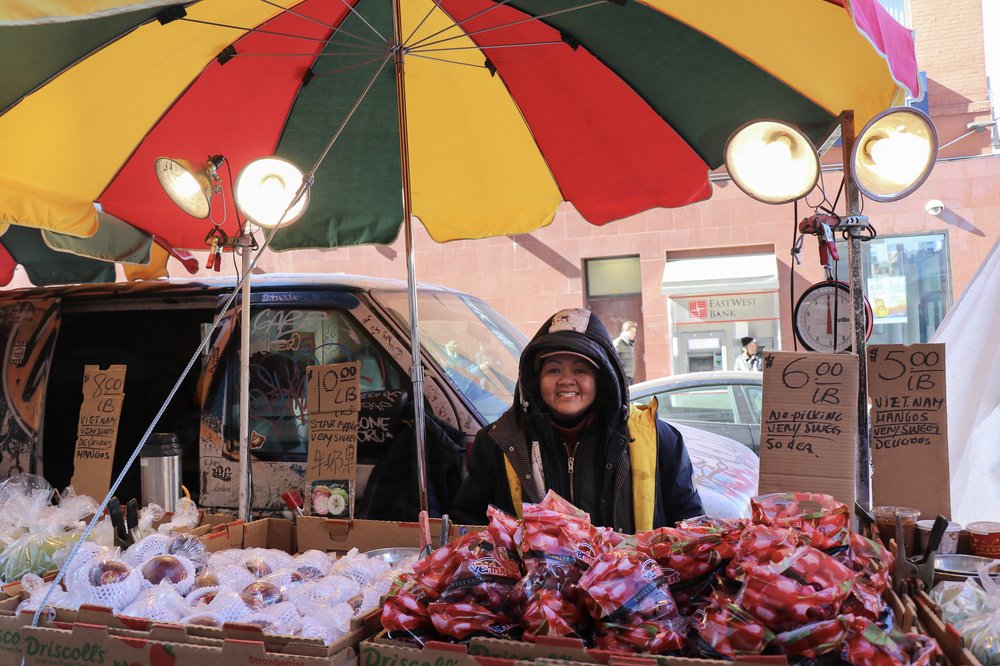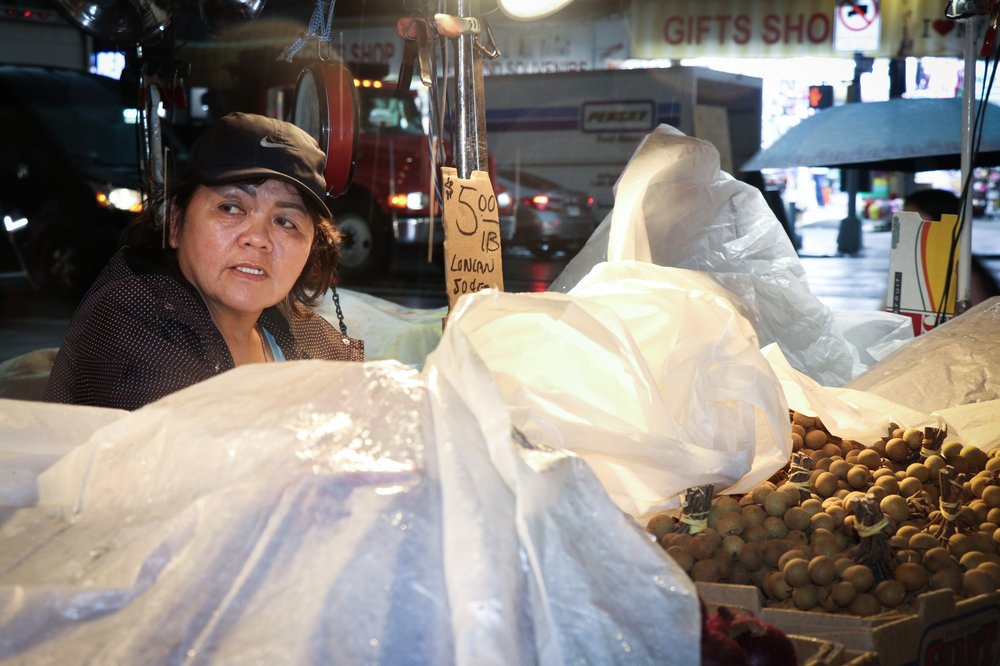Meet the fruit seller who’s been on this Chinatown corner for 27 years
Feb. 28, 2024, 12:01 p.m.
Muoi Trong has sold fruit at the corner of Mulberry and Canal for 27 years. Her children have attended Ivy League schools.

Chances are you've passed Muoi Truong in Manhattan, even if you didn't know her name.
She's run the fruit stand at the corner of Mulberry and Canal streets for the past 27 years. Truong said she’s been parked on the same corner, seven days a week, from 6 a.m. to 9 p.m., since 1997. As a part of the landscape, she consistently appears in Google Maps’ Street View.
She has worked through illnesses for decades – though she once took a half-day off for an ear infection. She's been at work during snowstorms and hailstorms, as well as during extreme heat and cold. She was on the corner when the twin towers fell during 9/11. Truong was also there two days before the Lunar New Year, which fell on Feb. 10 this year.
Truong remains a Chinatown fixture despite being 55 years old, working the stand for nearly three decades, and raising four children — including two Ivy League graduates. She says she can't quit working.

And customers keep coming. On that frigid Thursday afternoon, they thronged her stand and bought traditional holiday fruits like oranges, kumquats, pomelos and apples. Truong, solid on her feet, was busy weighing fruit and packing it into bags according to customer orders.
If she sensed hesitation from a shopper, she’d pitch them: “They’re sweet. Sweet like you.” She was standing for hours at a time, keeping a close eye on the crowd, and sipping tea from her Thermos every now and then.
“She’s just built different,” said her daughter, Amy Vo, in a recent phone interview.
In the past several decades, Truong took off work once a year: to take her four children on five-day trips to somewhere warm. Once they went to Florida; another year, they visited Cancun.
Immigrants like Truong are more than twice as likely as native-born residents to start their own businesses, according to research by the city of New York. One theory is that previous professional credentials and recommendations may not translate here; whereas to start a business, all you need is cash.
Many of the city’s immigrants often opt to open restaurants or grocery stores. The overhead is even smaller when it comes to starting a street stand, though opportunities like these have shrunk over the years as the city has limited street vendor permits.
Arepa Lady’s Maria Cano was a judge and university co-founder before she helmed her famous Colombian street cart. Evelia Coyotzi grew her Evelia’s Tamales chain from a street stand, where she arrived at 4:30 a.m. to feed the mostly immigrant construction and restaurant workers heading to work for an early shift.
Immigrants are not a monolith. Many hail from wealthier classes, and some arrive with connections or other forms of privilege, but Truong is among those who had to pick up a job as a matter of survival.
Truong couldn’t see any economic opportunities for herself in postwar Vietnam, so she immigrated to the United States in 1992, squeezing into an apartment in Elmhurst, Queens, with her sister, mother and brother as well as his family.
She later moved to a Canal Street apartment building, where she met her now-husband. He was already working the Chinatown fruit stand when they started dating, and she became the matriarch of the business years later.
One reason her stand has survived over the years is the fact that she offers low prices on the freshest fruits, which she described as her competitive advantage. It’s also partly why it takes her two hours to set up shop every morning: She filters through her daily wholesale delivery for the best produce. (She said she sends the rejects back to the distributor and demands they send her better-quality substitutes.) She sells two Driscoll’s blueberry packs for $4, and 2 pounds of seedless tangerines for $4.
Culinary historian and Chinatown preservationist Grace Young said “profit margins are razor-thin" for street vendors like Truong. To make enough profit on 33-cent apples, scale is necessary.
“You have to sell a lot. That's how you make your money,” she said.
Obtaining that volume requires long hours, and there’s no cutting corners.
“Chinatown shoppers are very, very discriminating and frugal,” said Young.
Linger by the fruit stand for a few minutes and you’ll catch customers haggling over a dollar. A 50-cent increase on a pomelo's price can send shoppers to another vendor. But Truong has been able to retain customers through generations, and has watched some of them grow from children to parents.
Another way Truong edges out her competition is on the sheer diversity of her fruits. She sells produce that can’t easily be found at the local Whole Foods, particularly because she’s catering to the food customs of the local Chinese American community, whose taste for tropical fruits can overlap with that of Caribbean cultures.
New York City-based cookbook author Ramin Ganeshram said she searched the city for her favorite Trinidadian fruit, the pommerac (or Malay apple) for 20 years. Her husband found it at Truong’s stand last year.
“I literally screamed when he took them out of the bag,” Ganeshram said in an Instagram post in May.
Most of Truong’s penny-scrimping profits have gone toward Saturday test prep classes, books and tutoring sessions for her children. In between, the kids would help their parents at the stand.
Truong raised her children out of a one-bedroom apartment on Mott Street. Now, some of them are Harvard and Columbia University graduates.
“I’m so proud,” said Truong. With glassy eyes, she showed me photos of her daughter Amy Vo’s white coat ceremony at Harvard Medical School.
“My daughter thanked me in Cantonese,” said Truong, who grew up speaking Cantonese, Vietnamese and Teochew. “I couldn’t believe it. I cried.”
“I was crying, too,” said Vo. “I owe everything to her.”
Years of physical labor have taken a toll on Truong. Her knees are constantly hurting, her legs are bowing and her feet are caving inward.
“She’s getting shorter,” said Vo. “We used to be the same height.”
But Truong refuses to quit working even though her kids have achieved elite college degrees and embarked on their own careers.
“If I don’t do anything, I go crazy,” said Truong.
Her daughter concurred: “She hasn’t had the time to know herself outside of work,” said Vo.
Despite her relentless work ethic, Truong recently made one concession. Her kids had been begging her to take more time off, rest her legs and find enjoyment in life outside of work.
Truong and her husband went on vacation in February.
She couldn’t wait for her children’s schedules to align, so she signed up for a 14-day cruise in Argentina and Chile.
“She said was going to do this for herself,” said Vo.
The lost master artist at the center of the Met’s Harlem Renaissance show The Brooklyn crew that turned preppy fashion into a streetwear staple